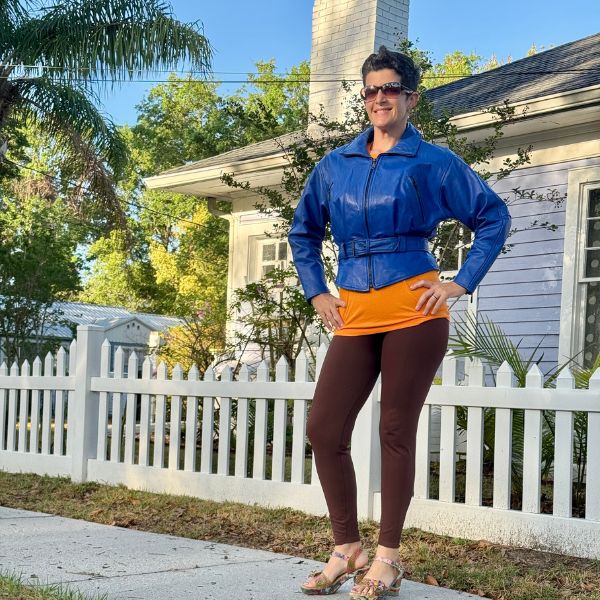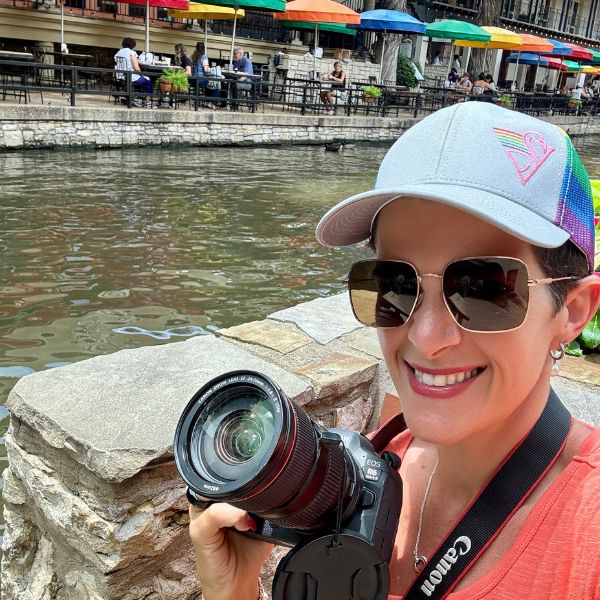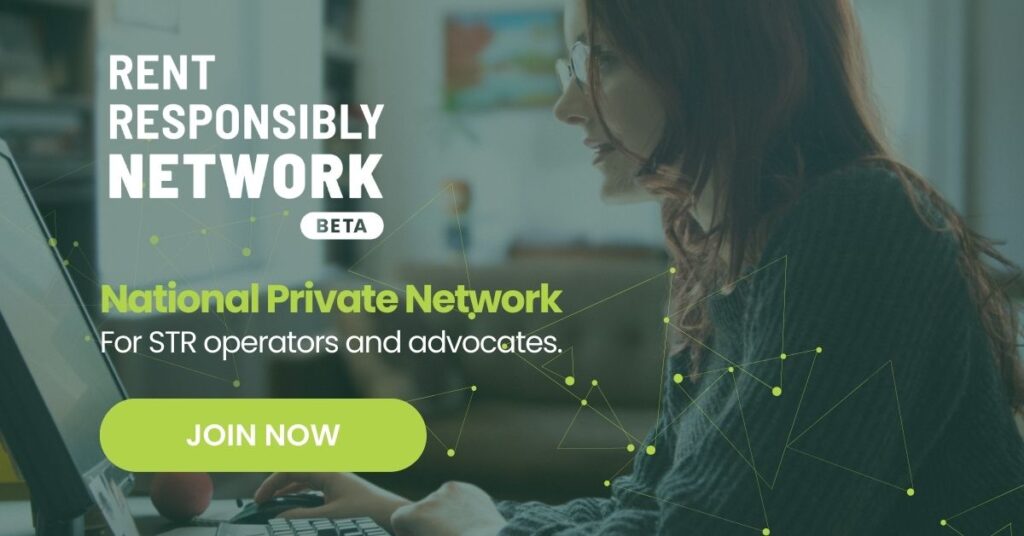Updated on June 10, 2025
When LGBTQ+ travel advocate Rachel Covello bought a vacation rental in Mount Dora, Florida, she wasn’t just investing in real estate. She was deepening her mission to promote welcoming spaces for marginalized travelers. A longtime storyteller and community builder, Rachel was drawn to Mount Dora’s small-town feel and inclusive culture – a creative haven where LGBTQ+-themed souvenirs can be found in many boutiques and gift shops.
Rachel, now an Airbnb Superhost, manages The Sunshine Lake Retreat herself, drawing on the same values and marketing savvy that drive her digital travel platform, OutCoast.com.

Her site, which began as a blog highlighting LGBTQ+ experiences in Florida, has evolved into a national resource spotlighting queer-friendly destinations and accommodations
OutCoast frequently features LGBTQ-friendly vacation rentals, cities, clubs, spas, beaches, and businesses on its travel blog, YouTube channel, directory, and event calendar. For other vacation rental operators, Rachel’s work offers inspiration and insights into how to make hospitality more inclusive to everyone.
A Florida venture
Rachel’s path to the vacation rental world began in 2016 during a visit to St. Petersburg, Florida. While exploring the city, she stumbled upon a stranger’s wedding band and managed to return it to its owner.
“It was very much like a you-were-in-the-right-place-at-the-right-time kind of moment,” she recalled. “I looked at [my wife at the time] and said, ‘I want to live near here.'”
Soon after, they discovered Gulfport, a nearby LGBTQ-friendly enclave, and purchased a condo. The couple initially split their time between Pennsylvania and Florida. Rachel eventually made the move permanent and began building a new life and business. Around that time, the couple ended their marriage on amicable terms, and Rachel eventually met her current partner, Margaret, in Florida.
OutCoast: A platform with purpose
Drawing on her background in writing, photography, and nonprofit work, Rachel launched OutCoast.com to share LGBTQ+ stories.
Her break came when the International LGBTQ+ Travel Association invited her to attend a conference in St. Pete. When the photographer backed out, Rachel stepped in, despite never having shot a professional event before.
“I was very nervous; I had never shot a conference…So it was a gamble, kind of fake it till you make it,” Rachel said. “I hired a second photographer just to make sure that I didn’t screw up, and I wound up loving the work I did. They loved the work I did, and so I wound up being their photographer for the next two years.”
That opportunity took her to Toronto and New York, helped forge industry connections, and paved the way for OutCoast to become Florida’s LGBTQ travel blog. By 2020, the site had expanded statewide, and Rachel began offering travel marketing and consulting services to destinations eager to grow through inclusion.
Rachel took her mission on the road, embarking on a monthlong trip across 16 Florida cities to create detailed travel guides that spotlight queer-friendly destinations.
A voice for inclusive representation

In 2023, Rachel found herself in the national spotlight after VISIT FLORIDA quietly removed its LGBTQ+ travel content. When the tourism board didn’t respond to her inquiries, she brought the story to NBC News, which ran it within hours.
“I was on TV a lot that week, and then other people started picking up the story,” she said. “I was trying to hold the state accountable for not representing inclusive destinations and the LGBT people in the state in their travel marketing.”
Florida welcomed more than 143 million visitors in 2024, and the global LGBTQ+ travel market is worth over $200 billion annually, according to the World Travel & Tourism Council. Rachel saw VISIT FLORIDA’s move as economically and ethically short-sighted. In response, she expanded OutCoast’s national reach and continued building a platform that champions inclusion.
Roots in community organizing
Before launching OutCoast, Rachel co-founded the LGBT Equality Alliance of Chester County in Pennsylvania. The idea sprang from the closure of Frank Jeffreys, the only gay bar in Phoenixville at the time.
The bar was a special place in Rachel’s life. It was where she had met her first wife after ending a difficult marriage to her college boyfriend, and it had offered her a sense of belonging and camaraderie.
“There was an LGBT community there that I didn’t expect, and I learned a lot about the community and the LGBT groups out there,” she said.
When it closed after one of the owners died unexpectedly, its absence left a vacuum.
“I don’t think we went back in the closet,” she said. “We just didn’t have anywhere to go and hang out and come back with other community members.”
In response, she began hosting monthly afternoon “tea dances” that eventually evolved into a nonprofit, the LGBT Equality Alliance of Chester County. The organization lobbied for county policy changes, hosted social events, and launched Chester County’s first Pride Fest, now in its eighth year.
“We changed a town,” Rachel said. “We made it like a little LGBT mecca – a destination on a map for the queer community. That’s still, to date, one of the things I’m most proud of.”
Looking ahead
Today, Rachel is using all of her experiences in building the next phase of OutCoast, focusing on broader inclusivity. She’s creating content for travelers who identify as plus-size, neurodivergent, or have disabilities, groups often left out of traditional travel marketing. She’s also finishing a degree in nutrition and exploring the intersection of wellness and travel.
She recently partnered with Visit Lauderdale to produce an accessibility travel guide and published a Neurodivergent-Friendly Travel Guide to Greater Fort Lauderdale in May 2025.
“We’re kind of leaning in more to creating a platform for those people who have often felt left out, or have felt like an outcast, to feel invited in,” she said.
Rachel’s tips to attract LGBTQ+ guests to your vacation rental
- Educate yourself on inclusive lingo
- Be mindful of how you address guests. Don’t assume the relationship of two people traveling together.
- Use gender-neutral terms like “partner” or “spouse” in communications.
- Understand that LGBTQ+ travelers often hesitate to disclose personal details out of concern for safety or prejudice. “There’s always a nervousness about that… Are there any preconceived notions about being LGBTQ?” Rachel said.
- Seek out LGBTQ+ hospitality training
Take advantage of available training programs to build inclusive practices, including:
- HospitableMe
- IGLTA (International LGBTQ+ Travel Association)
- Airbnb training resources
- Travel Proud Training
- Advertise on LGBTQ+ platforms and blogs
- Promote your listing on LGBTQ+-friendly websites and blogs, such as:
- OutCoast.com
- LGBTQ+ listing sites
- Local LGBTQ+ newsletters and blogs
- Partner with LGBTQ+ creators through paid collaborations or trade opportunities (e.g., free stays in exchange for features).
- Diversify your social media outreach
Don’t limit your marketing to Instagram. Many LGBTQ+ travelers, especially older and affluent ones, use Facebook and LinkedIn.
- Get involved locally
- Join your local LGBTQ+ Chamber of Commerce or Equality group.
- Attend community events and offer your rental as a prize or donation for galas and fundraisers.
- Build connections with locals—they often refer travelers.
Read more: Stories of Inclusive Hospitality
- Offer transparent accessibility information
- Clearly state in your listing:
- Doorway widths
- Thresholds or steps
- Bathroom accessibility
- Shower setup
- Patio or yard access
- Include whether guests in wheelchairs can maneuver easily.
- Add accessibility features
- Provide small ramps for steps or thresholds.
- Ensure light switches and essentials are within reach.
Read More: How Lorraine Woodward made a platform for accessible vacation rentals
Here are eight other ways you can make your property more accessible for $100 or less
- Think about plus-size travelers, too
- Install showers that don’t require contortions to turn on water.
- Provide full-size towels.
- Avoid cramped or awkward layouts.
Learn how you can increase your ROI through other responsible design measures.
…


